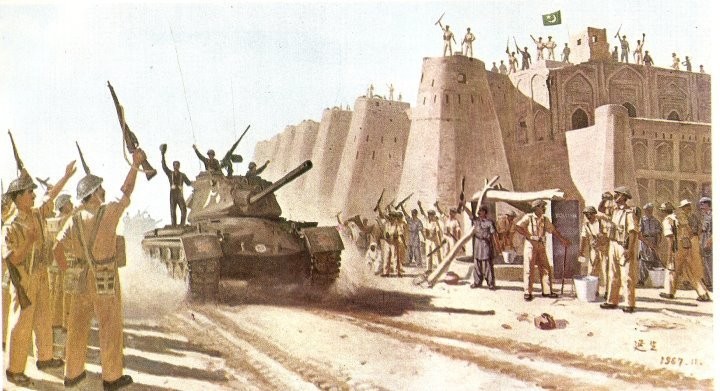
The 1965 war between Pakistan and India is remembered not only for its strategic significance but, more importantly, for the incredible stories of bravery and sacrifice by the Shuhada (martyrs) of Pakistan who laid down their lives for the defense of their homeland. These heroes, hailing from various regions and backgrounds, exemplified the highest standards of valor, patriotism, and selflessness, etching their names in the annals of Pakistan’s history. As we honor their memory, we are reminded of the price of freedom and the unyielding spirit of those who safeguarded it.
Major Raja Aziz Bhatti
One of the most iconic figures of the 1965 war is Major Raja Aziz Bhatti Shaheed, a name synonymous with bravery and unwavering dedication. Born in Hong Kong and later raised in the rural landscapes of Gujrat, Pakistan, Major Bhatti joined the Pakistan Military Academy in the first PMA Long Course and quickly proved his mettle as an exemplary officer.
During the 1965 war, Major Bhatti was deployed to the strategic Burki sector near Lahore, a critical front where the enemy’s advance threatened the heart of Pakistan. Despite facing relentless artillery shelling and continuous waves of attacks, Major Bhatti stood firm, leading his men from the front for five consecutive days and nights. On September 10, 1965, while directing artillery fire and defending his position, Major Bhatti was struck by enemy fire and embraced martyrdom. He was awarded the Nishan-e-Haider, Pakistan’s highest military honor.
Captain Nazir Ahmed
Captain Nazir Ahmed served in the medium artillery regiment stationed in the Qasur sector, under the command of Brigadier A.R. Shamsi during the 1965 war. As a forward observation officer, Captain Nazir was responsible for directing artillery fire onto enemy positions from the frontline. His position placed him directly in harm’s way, but he remained undeterred. On September 8, 1965, while performing his duties with unwavering dedication, Captain Nazir was struck by a bullet in his right eye, leading to his martyrdom.
Major Muhammad Fazil
Major Muhammad Fazil was part of the support battalion stationed near the Wagah border at the Achhokhel Band village. During the intense skirmishes of the war, the battalion’s weapons depot came under a sudden attack from the enemy, leading to a devastating fire. Major Fazil, with selfless devotion to duty, immediately engaged in efforts to save the depot and its valuable resources. Amid the chaos, an enemy bullet struck him in the head, resulting in his martyrdom.
Lieutenant Muhammad Naeem Akhtar
Lieutenant Muhammad Naeem Akhtar, a brave officer of the Punjab Regiment, was stationed at the strategically important Hajji Pir Pass in Kashmir. The pass was a critical point of contention during the 1965 war. On September 8, 1965, as Indian forces launched a fierce attack on the position, Lieutenant Naeem Akhtar led his men in a valiant defense. Despite being severely wounded in the battle, he continued to fight with remarkable courage until he succumbed to his injuries.
Captain Anwar-ul-Haq
Captain Anwar-ul-Haq was a dedicated officer of the Baluch Regiment, stationed on the Wagah border, a critical front during the 1965 war. The regiment faced one of the fiercest attacks from Indian forces, during which two Pakistani tanks were destroyed. However, Captain Anwar-ul-Haq and his comrades did not falter. They mounted a strong counterattack against the enemy, displaying exemplary valor. In the heat of battle, Captain Anwar-ul-Haq became the target of enemy fire and embraced martyrdom. His bravery and sacrifice were recognized when he was posthumously awarded the rank of Major.
Squadron Leader Mohammad Mehmood Alam
In aerial combat over enemy territory, Squadron Leader Mohammad Mahmood Alam, piloting an F-86 Sabre Jet, exhibited remarkable prowess. He shot down two enemy Hunter aircraft and damaged three others. The following day, he accomplished a historic feat by destroying five enemy Hunter aircraft in less than a minute while intercepting enemy aircraft attacking PAF Station Sargodha. This record still stands today. His exceptional flying skills and valor earned him the Sitara-e-Jurat.
Squadron Leader Sarfaraz Ahmed Rafiqui
Squadron Leader Rafiqui led a formation of three F-86 aircraft in a strike against Halwara airfield. Despite being warned about numerous enemy interceptors in the air, he pressed on with his mission. During the return, his formation was intercepted by about ten Hunter aircraft. After shooting down one enemy aircraft, his guns jammed. Instead of retreating, he ordered his No. 2 to take over as leader and continued to engage the enemy defensively in his unarmed aircraft. Squadron Leader Rafiqui’s courage and dedication in this battle were truly exceptional. Although he lost his life when his aircraft was shot down, his actions enabled his formation to down three more Hunter aircraft. He displayed outstanding leadership and courage and was awarded the Hilal-e-Jurat.
Air Marshal Malik Nur Khan
Air Marshal Malik Nur Khan, a founding father of the modern Pakistan Air Force and former Commander-in-Chief, achieved extraordinary victories during the 1965 war, leading a force that was significantly outnumbered. His remarkable valor earned him the Hilal-e-Jurat, Sitara-e-Quaid-i-Azam, and Sitara-e-Pakistan. Furthermore, he was bestowed with the Order of Istiqlal (Second Class) by the King of Jordan.
The Legacy of the 1965 Shuhada
The Shuhada of the 1965 war left behind not only their names etched in stone but also a legacy that continues to inspire Pakistan’s armed forces and citizens alike. Their sacrifices were not just acts of bravery; they were expressions of a deep, unshakable love for their country. These heroes came from diverse backgrounds, representing the unity in diversity that is the strength of Pakistan.



















Leave a Reply